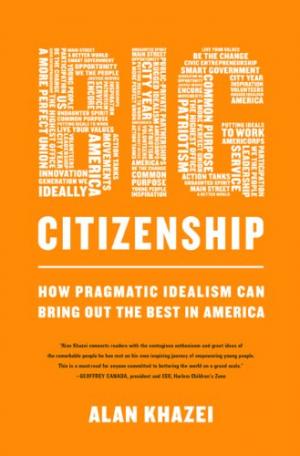Big Citizenship: How Pragmatic Idealism Can Bring Out the Best in America

Alan Khazei is a heckuva guy. In 1988, he co-founded City Year, a privately funded domestic service organization that lead directly to the establishment of AmeriCorps. When AmeriCorps was threatened out of existence by budget cuts in 2003, Khazei spearheaded the drive to save it. Today he runs Be the Change, Inc., a group that “creates national public awareness campaigns to build momentum for citizen service as a practical solution to problems facing our communities and our country.” A better-intentioned guy would be hard to find.
Alan Khazei is also a politician. In 2009, he lost the Democratic primary for the Senate seat made vacant by the death of Khazei’s colleague and hero, Ted Kennedy. Everyone knows that the winner of that primary, Martha Coakley, lost in the general election to former Cosmo model Scott Brown. Had Coakley won by a clear margin, I doubt that Khazei’s Big Citizenship would exist. The book’s lines announce that Alan Khazei really loves his country; between them, the reader understands that Khazei plans to run for office again, with this sunny, confident book as part of his pitch.
Big Citizenship is ostensibly the tale of how Khazei cooked up the idea to send idealistic seventeen- to twenty-four-year-olds into urban communities for a year of full-time service and what transpired afterwards. The book tells this story well, but it does little more than that: we’re not shown, in the creative nonfiction sense, what motivated Khazei. Guilt? Ego? Existential despair? All we’re told of Khazei’s early life is how dearly he loved his immigrant relatives, all of whom loved America so much that Khazei had no choice but to love it, too. We’re led to believe that City Year emerged from this overwhelming love of country (and love for the older Kennedy brothers, John and Robert).
Before you toss a used tea bag my way, let me assure you that I’m also fond of my homeland, including its ability to learn from its troubled history. Unfortunately, Khazei fails to unpack any of the root causes of persistent poverty and inequality, preferring instead to direct his considerable energy towards his many service organizations.
The birth of City Year smacks so much of Ivy League elitism (we, the Upper Class, shall help you, the Lower Class) that it’s easy to forget that Khazei, son of an Iranian immigrant, must have endured taunts of “Ayatollah Assa-holah” as a St. Paul’s prepster in 1979. But Khazei avoids introspection at every turn. His consistent emotional distance, perhaps born of his bruising Senate campaign, quells any desire in the reader to use Khazei’s methods to “bring out the best in America.”
Nitpicking the founder of a program that has done so much good for so many feels singularly shameful, but here it is: Big Citizenship is boring. Reading it is as much a chore as eating a plateful of steamed vegetables: good for you, yes, but in desperate need of salt. Were Khazei not planning a future campaign, I suspect he’d have shared a more complex portrait of City Year, including the inevitable ugliness and frustration, perhaps even acknowledging his own class privilege more deeply than expressing a vague desire to “give back.”